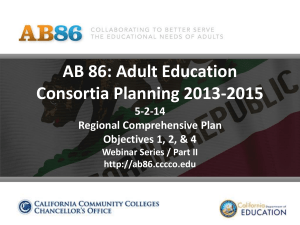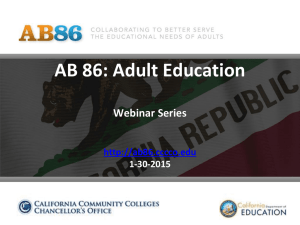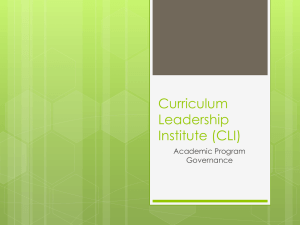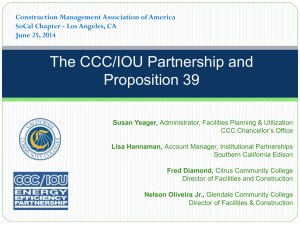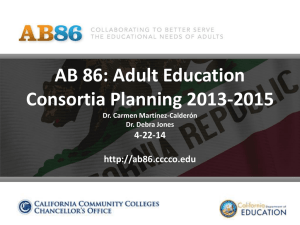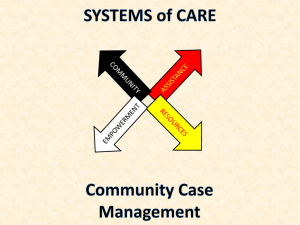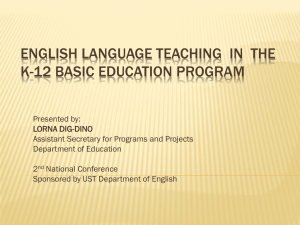PPTX - AB 86
advertisement
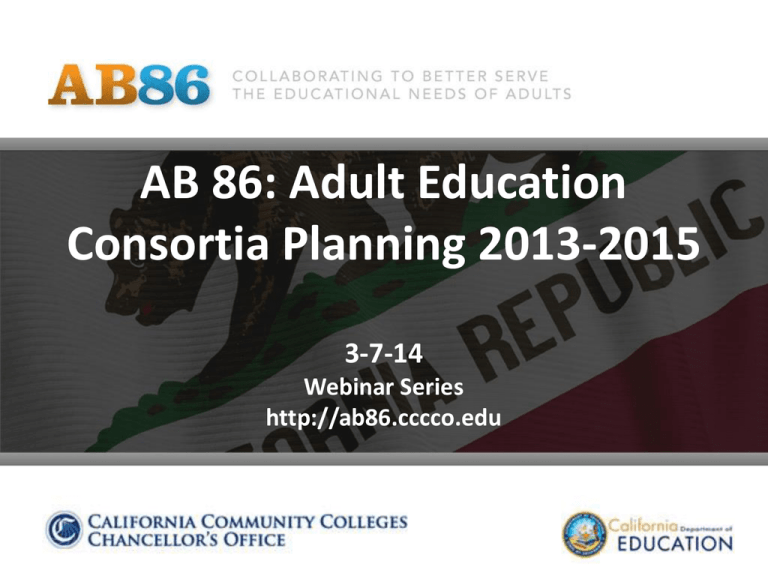
AB 86: Adult Education Consortia Planning 2013-2015 3-7-14 Webinar Series http://ab86.cccco.edu Adult Education in California Quick Comparison: K-12s and CCCs Donna Burns, Dean, Continuing Education Mt. San Antonio College & Bob Harper, Director, Campbell Adult and Community Education Special thanks to many collaborators from both systems. 3/7/2014 Some Key Points in Adult Ed History • • • • • • • • • • • • • • 1856 - First adult ESL class in San Francisco’s Old St. Mary’s Church 1902 - Statewide public funding for Adult Education in California 1921 - The 25+ class on demand state legislation 1940s - 50s – Junior colleges spinning off from adult schools and local school districts 1966 - The Federal Adult Education Act 1978 - Prop 13 radically altered adult school and community college programs 1986 - The immigration reform amnesty program 1996 - Welfare Reform 2007 - Enrollment in CA adult schools at 1.6 million students in California 2008 - 94,220 FT Equivalent students in CCC noncredit in 07-08 2009 - Adult school funding “FLEXED” - open to school district s for any purpose 2007 to 2013 – Funding for adult schools cut by about 2/3. Funding for CCC noncredit cut by about 1/3. 2013 - AB86 Much of our history and culture is shared, but we have distinctions 3/7/2014 Instructional Programs CCC (EC 84757) K-12 (EC 41976) • • • • • • • • ABE/ASE* ESL (incl. ESL - Citizenship)* Career Tech Education (CTE)* Adults w/Disabilities* Parent Education Health & Safety Home Economics Older Adults • • • • • • • • • ABE/ASE* ESL* Immigrant Education (incl. Citizenship & Workforce Prep.)* Short-Term Vocational (CTE)* Adults w/Disabilities* Parent Education Health & Safety Home Economics Older Adults * Programs included in AB86 planning. 3/7/2014 Academic & Professional Matters • • • • • K-12 Local decision making Local regional “networks” CDE Adult Education Office OTAN and CalPRO Professional organizations: CCAE, CATESOL CCC • Local decision making – “shared governance” • Academic Senate for the California Community Colleges– primary role in curriculum, professional development, minimum quals, tenure, more… (asccc.org) • CCC WIA II participants in regional networks • Professional organizations, e.g., CATESOL, CCCAOE, 3CSN 3/7/2014 Curriculum Development K-12 • Reporting to CDE Adult Ed Office – “claiming a course” on the A22 list of approved courses. • New course outlines created and submitted meeting state requirements (elements in the course of study, job market survey, etc.) • Local ability to create courses very quickly. • HS credit aligned to state and local district standards • All courses approved by local district Board of Trustees. CC • Course elements meet state requirements • New & modifications go through local approval (Academic Senate & Trustees) and CCCCO • CCCCO system tracks key course and certificate data elements • Mandatory 4-year review; CTE programs are 2-year review • HS credit aligned to state; submitted for UC a-g (HS programs WASC ACS accredited) • SLO assessment cycles (ACCJC) 3/7/2014 Faculty Qualifications K-12 CCC • Passing the CBEST Exam • Valid Teacher Credentials issued by the California Commission on Teacher Credentialing (CCTC) • Administrative Credentials (CCTC) • Pupil Personnel Services Credentials (CCTC) • “Minimum Qualifications” per Title 5 (handbook link) • Educational level by discipline; CTE may also need licensure or experience • Local Academic Senate may add equivalent or higher (but not reduced) qualifications 3/7/2014 Assessments for Placement • • • • • • K-12 Local Discretion CASAS Reading or Listening Tests Oral interviews Writing samples Test of Adult Basic Education (TABE) GED Readiness Assessments/Pre-tests • • • • CCC Instruments must be approved by Chancellor’s Office. Rigorous validation process for approval of local instruments. Multiple measures Some instruments have state approval for use locally 3/7/2014 Funding • • • • K-12 Categorical Adult Ed. Apportionment to Unified and Union HS Districts (in FLEX since 2009). Class Fees 2015: Local Control Funding Formula (LCFF) poses a problem Grants: VTEA, WIA Title II, Community Foundations, WIBs, social services • • • • CCC General fund apportionment has always been flex at local level Grants: VTEA, WIA Title II, WIBs, similar to K-12 CCC Student Success & Support Program (SSSP – Categorical) CCC Basic Skills Initiative (BSI – Categorical) 3/7/2014 Funding, Continued • • • • K-12 Unit of ADA = 525hrs. Apportionment pre FLEX Apportionment after FLEX Maintenance of Effort: Amount of K-12 district funds used for AE in 2012-2013 must continue at same level through June, 2015. • • • • • CCC FTES = 525hrs. Non-Credit Enhanced Non-Credit Credit Other categorical state 3/7/2014 Outcomes Reporting (State Systems) K-12 • WASC Accreditation and Student Learning Outcomes • WIA (TopsPRO) accountability system • GED Certificates and HS Diplomas • Literacy gains • Subject area tests CCC • State Scorecard from locallycollected student data (CCCCO data system) • Cohort major outcomes (certificates, transferready, degree) • Course-level progress in process • Local SLO outcomes “cycle of assessment” for accreditation • Local grades, certificates, diplomas, gains (WIA II) 3/7/2014 Other Performance Metrics • • • • • • • K-12 CTE Certifications HS credits, ESL completions, HS Diplomas HS Equivalency (e.g., GED) Transition to Postsecondary Employment (getting a job, keeping a job) For WIA II (AEFLA) recipients, CASAS assessments for ABE, ASE Citizenship & ESL Reporting to the local district Board of Trustees • • • • • • • CCC CTE Certifications* ESL & Basic Skills certificates* HS credits, Diplomas* HS Equivalency (e.g., GED)* Transition to Postsecondary* Employment (getting a job, keeping a job) For WIA II (AEFLA) recipients, CASAS assessments for ABE & ESL * Included data on Chancellor’s Office Scorecard 3/7/2014 Questions? • Email us at ab86@cccco.edu • Visit the AB 86 website at http://ab86.cccco.edu • Share the good work that you are doing by being a webinar presenter – Contact the Work Group at ab86@cccco.edu. 3/7/2014

